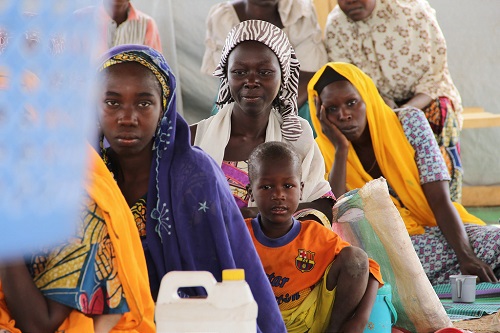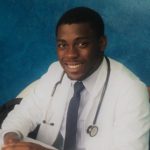OCHA/Ivo Brandau photo
By
Joseph Besong
Dr Njang Emmanuel Mbeng of the Fundong District Hospital in Cameroon walks us through the nightmare of Health Care in Cameroon in a recent interview, explaining the reality as it entails in the Central African country. Below is my interview with the young and devoted medical practitioner in the Fundong District Hospital in Cameroon.
Joseph Besong: You were recently recognized with an award from the prestigious University of Buea Medical Award on Leadership. What’s your secret behind this achievement?
Dr Emmanuel: I was honoured to receive such an award from the prestigious University of Buea Medical School Alumni Association (UBMSAA) given that it’s the first of its kind. An individual is accomplished when his mission finds a common ground with his passion. Going through medical school my desire was and still is to create a positive impact wherever I find myself. Creating an impact in health care through leadership is something I am very passionate about. So I always make sure I get involved in leadership workshops; volunteer in health campaigns organized by the various medical school associations across the country, and so much more. This is to enable me to acquire the necessary experience to be a good leader in the health sector. So I would say passion is the secret behind my achievements.
Joseph Besong: Many Cameroonians die of curable diseases due to many factors. What is the root cause of this nightmare in the country?
Dr Emmanuel: This can be attributed to low levels of health education. Most of us know little about our health. As a consequence, we fail to take the necessary precautions to prevent diseases. Imagine a patient who hears about type 2 diabetes for the very first time only when his/her leg has to be amputated due to a complication of this disease. A man/woman hears about a cerebrovascular accident (stroke) for the first time when he/she is lying paralyzed in a hospital bed. Had it been they had some knowledge of the risk factors and preventive measures of these diseases, the outcome would have been different. In an attempt to solve this problem, non-governmental organizations such as Health Education and Research Organization (HERO) Cameroon has a primary objective to educate its community on health diseases of public health interest, laying emphasis on non-communicable diseases such as diabetes and hypertension which are on a constant rise. Prevention is better than cure, and the most important aspect of prevention is education.
Joseph Besong: What’s the place of traditional medicine in Cameroon?
Dr Emmanuel: Before we readily had access to medications from the western world, our grandparents and great grandparents used natural herbs to treat diseases. So I would say traditional medicine has a place in Cameroon.
Joseph Besong: As a modern practitioner, do you recommend traditional medicine to our patients?
Dr Emmanuel: Before prescribing a medication to a patient, I make sure I read through the leaflet to know the possible side effects of that medication. Given that I have little or no knowledge on the composition and side effects of traditional medications, I do not recommend traditional medications to patients.
Joseph Besong: In Cameroon like other African countries, health care is not taken seriously. Is there a way forward?
Dr Emmanuel: I wouldn’t say health care is not taken seriously. Over the years Africa has and is still fighting communicable diseases and quite a lot has been done. However, there has been the emergence of communicable diseases which are on a geometric rise. Consequently, Africa faces a double burden of communicable and non communicable diseases. Our health care systems have put in a lot of effort in improving health care, but there is still a lot to do. We need to pay more attention to non-communicable diseases like stroke hypertension and Chronic Kidney Disease.
Joseph Besong: What is your advice to the government of Cameroon and other health care providers?
Dr Emmanuel: For us to have a productive nation, we need to be in good health. I will humbly recommend that health care providers emphasize more on preventive medicine through health education workshops, seminars, and sensitization campaigns. Preventive medicine is feasible and cost effective.
Joseph Besong
I am the editor-in-chief of Kilimandjaro radio. I hail from Africa, precisely from Cameroon in Central Africa.
I did my secondary education at Bishop Rogan College Soppo-Buea located in the South West Region of Cameroon. After graduation, I proceeded to the University of Buea-Cameroon where I read English minor in Journalism and Mass Communication. I later worked in Cameroon as a broadcaster with Two radios namely Radio Evangelum and CBS Radio all located in Buea.
Presently, I work with Kilimandjaro radio, an online radio station based in Canada.
Dr. Njang Emmanuel Mbeng
Dr Njang Emmanuel Mbeng is a former President of the Federation of African Medical Students Association (FAMSA), CFO HERO Cameroon and now works as a Doctor at the Fundong District Hospital in Cameroon.




Dr Njang sounds like an amazing man and I believe he's absolutely right when he says education is key to stopping these preventable deaths from curable diseases. We need more people in the world like Dr Njang! It would be such a better place. Great website you guys have keep up the good work and hello from the United Kingdom. Thanks Jon
A great article
Indeed prevention is better than cure. More emphasis is to be placed at the community.
Great interview.
Good talk my dear Dr Njang. I'm totally positive about your leadership skills and I know HERO Cameroon would help us improve our population's knowledge of diseases. Preventive medicine is important as you mentioned and I belief our political leaders can do more in the health sector.